TEHRAN: The United Nations and the United States appealed for restraint on Thursday after Iran and Pakistan traded deadly air strikes on militant targets on each other’s territory.
The rare military action across the porous border between the heavily armed neighbors has further stoked tensions already enflamed by the Israel-Hamas war.
Pakistan’s strikes against militant targets in Iran early on Thursday came two days after similar Iranian strikes on its territory, and prompted Tehran to summon Islamabad’s envoy.
At least nine people were killed in the strikes in restive Sistan-Baluchestan province, most of them women or children, Iran’s official IRNA news agency reported.
They came after Iran carried out raids on what it described as “terrorist” targets in Pakistan on Tuesday, killing at least two children.
While Iran and nuclear-armed Pakistan often accuse each other of allowing militants to operate from the other’s territory, cross-border operations by government forces have been rare.
UN chief Antonio Guterres called on the two governments to “exercise maximum restraint.”
“The secretary general is deeply concerned about the recent exchange of military strikes between Iran and Pakistan, which have reportedly caused casualties on both sides,” his spokesman Stephane Dujarric said.
White House National Security Council spokesman John Kirby said the United States was monitoring the situation “very, very closely” and was in touch with Pakistani officials.
“These are two well-armed nations and again we don’t want to see an escalation,” Kirby told reporters.
US State Department spokesperson Matthew Miller echoed his comments.
“We don’t believe this should escalate in any way, shape or form. Pakistan is a major non-NATO ally of the United States, that will remain the case, but we would urge restraint in this case.”
Kirby said he was “not aware” that Islamabad had notified Washington before striking Iran. He would not comment when asked if the United States would provide support for Pakistan.
Pakistan’s foreign ministry described Thursday’s raids as a “series of highly coordinated and specifically targeted precision military strikes against terrorist hideouts” in Sistan-Baluchistan.
The strikes took place at around 4:30 am (0100 GMT), with three drones destroying four houses in a village near the city of Saravan, IRNA said, citing Alireza Marhamati, deputy governor of the province.
Iranian media carried images showing severely damaged homes, with one video showing people gathered around a crater.
All of those killed were Pakistanis, and investigations were under way to determine why they were in the Iranian village, Marhamati said.
The raids targeted Baloch separatists, according to the Pakistani army. The military has been waging a decades-long fight against separatist groups in its sparsely populated border region.
Iran condemned the action, and summoned Pakistan’s charge d’affaires “to protest and request an explanation from the Pakistani government,” foreign ministry spokesman Nasser Kanani said.
The ministry described Pakistan’s strikes as “unbalanced and unacceptable,” and said Iran expects Pakistan “to adhere to its obligations in preventing the establishment of bases and armed terrorist groups in Pakistan.”
Militant group Jaish Al-Adl (Army of Justice) has carried out repeated deadly attacks on Iranian security forces in recent months, and Tehran has long alleged that it operates out of rear bases across the border.
Pakistan delivered a strong rebuke to Iran over its strikes, recalling its ambassador from Tehran and blocking Iran’s envoy from returning to Islamabad.
China offered to mediate between the neighbors, both close economic partners of Beijing.
The European Union expressed concern about the “spiral of violence in the Middle East and beyond.”
Rising Iran-Pakistan tensions add to multiple crises in the region, with Israel waging a war against Hamas in Gaza and Houthi rebels in Yemen attacking commercial vessels in the Red Sea.
Meanwhile Afghanistan, which borders both Iran and Pakistan, and is home to a small Baloch minority, said the violence between its neighbors was “alarming” and urged them to “exercise restraint.”
On Thursday, Pakistan’s foreign ministry said Prime Minister Anwar-ul-Haq Kakar would cut short his visit to the World Economic Forum in Davos, Switzerland, “in view of the ongoing developments.”
Hours before the strike, Kakar had met Iran’s foreign minister on the sidelines of the forum and posed for photographs.
Sistan-Baluchestan province is one of the few mainly Sunni Muslim provinces in Shiite-dominated Iran and has seen persistent unrest involving cross-border drug-smuggling gangs and rebels from the Baloch ethnic minority as well as other militants.
International calls for calm after Iran, Pakistan trade strikes on militants
https://arab.news/w2fsg
International calls for calm after Iran, Pakistan trade strikes on militants

- UN chief Antonio Guterres called on the two governments to “exercise maximum restraint”
- US says monitoring situation “very, very closely” and was in touch with Pakistani officials
Afghans who made Pakistan home to escape war now hide from deportation
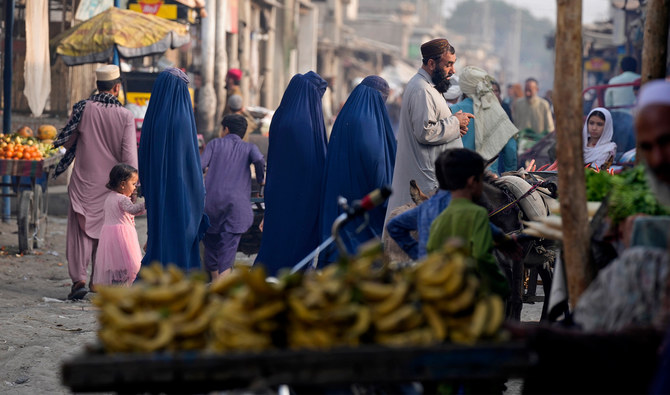
- Pakistan has forcibly deported some 600,000 undocumented Afghans since October 2023
- Afghans in hiding find it difficult to earn money, rent accommodation or get medical help
KARACHI, Pakistan: Born and raised in Pakistan to parents who fled neighboring Afghanistan half a century ago, an 18-year-old found himself at the mercy of police in Karachi who took his cash, phone and motorbike, and sent him to a deportation center.
Scared and bewildered, he spent three days there before he was sent back to Afghanistan, a place he has never been to, with nothing but clothes on his back.
The youth is one of at least 1.7 million Afghans who made Pakistan their home as their country sank deeper into decades of war. But they’ve been living there without legal permission, and are now the target of a harsh crackdown on migrants who Pakistan says must leave.
Some 600,000 Afghans have returned home since last October, when the crackdown began, meaning at least a million remain in Pakistan in hiding. They’ve retreated from public view, abandoning their jobs and rarely leaving their neighborhoods out of fear they could be next for deportation.
It’s harder for them to earn money, rent accommodation, buy food or get medical help because they run the risk of getting caught by police or being reported to authorities by Pakistanis.
The youth, who had been working as a mechanic in an auto shop since he was 15, spoke on condition of anonymity for fear of arrest and deportation.
He has applied for the same documentation that his family has, but he won’t get it. Pakistan isn’t issuing paperwork for Afghan refugees or their children.
“My life is here. I have no friends or family in Afghanistan, nothing,” the young man told The Associated Press. “I wanted to come back (to Pakistan) sooner, but things had to calm down first,” he said, referring to the anti-migrant raids sweeping the country at the time.
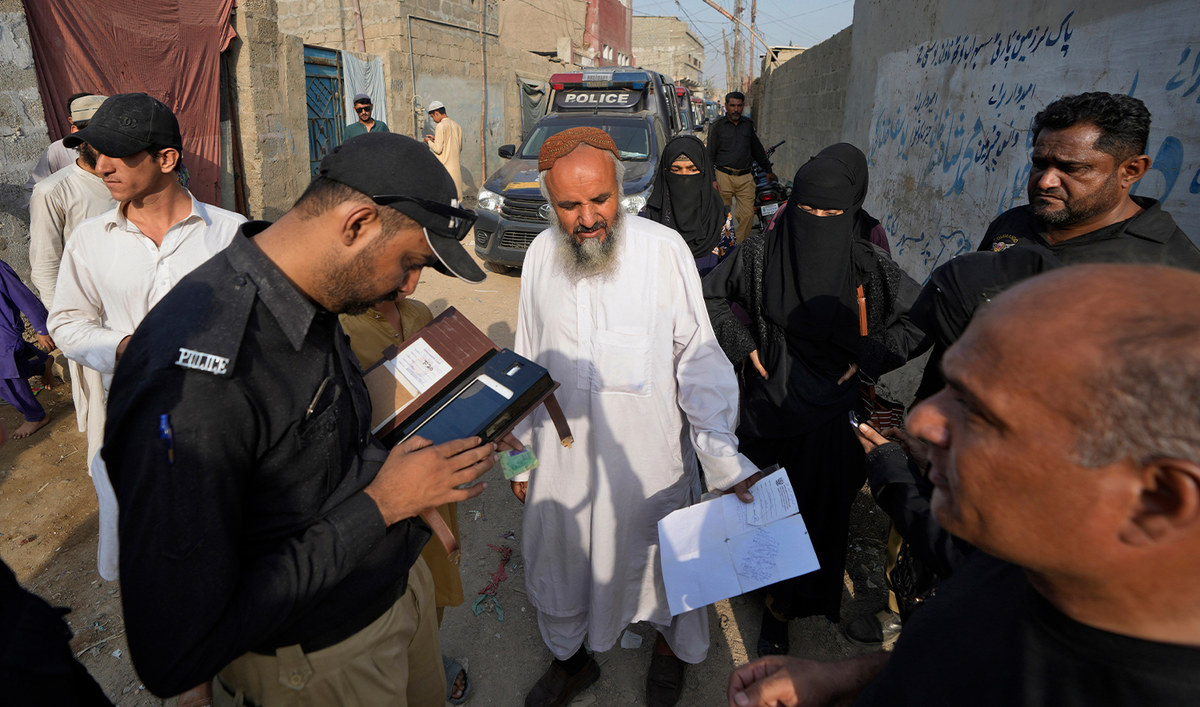
Taliban authorities gave him 2,500 afghanis ($34) once he entered Afghanistan to start a new life. They dispatched him to northeastern Takhar province, where he slept in mosques and religious schools because he knew nobody to stay with. He passed his time playing cricket and football, and borrowed other people’s phones to call his family.
Six weeks later, he traveled from Takhar to the Afghan capital, Kabul, then to eastern Nangarhar province. He walked for hours in the dark before meeting up with human smugglers hired by his brother in Pakistan. Their job was to get him to Peshawar, the capital of Pakistan’s northwest Khyber Pakhtunkhwa province, for the price of $70.
He is relieved to be reunited with his family. But he is vulnerable.
Police have daubed numbers on homes in his neighborhood to show how many people live there and how many have documentation. Hundreds of Afghan families have fled the area since the operation began. There are fewer people to hide among.
Such neighborhoods in Karachi are easily home to tens of thousands of Afghans. But they have no drainage systems, health care or education facilities. There are few women on the streets, and those who venture out wear burqas, often the blue ones more commonly seen in Afghanistan.
Lawyer Moniza Kakar, who works extensively with the Afghan community in Karachi, said there are generations of families with no paperwork. Without it, they can’t access basic services like schools or hospitals.
Afghans were already under the radar before the crackdown, and rumors abound that Pakistan wants to expel all Afghans, even those with documentation. Pakistan says no such decision has been made.
In another Karachi neighborhood with a mostly Afghan population, people scatter when police arrive, disappearing into a maze of alleys. A network of informants spread news of the visits.
Kakar despairs at the plight of Afghans who remain in Pakistan. “Sometimes they don’t have food so we appeal to the UN to help them out,” she said. To earn money or get medical help, they would have previously traveled from such neighborhoods into the heart of Karachi, but they can’t afford these journeys anymore. They’re also likely to be arrested, she added.
Some show Kakar their ID cards from the time of Gen. Zia Ul-Haq, the military dictator whose rule of Pakistan coincided with the 1979 Soviet invasion of Afghanistan. “They wonder why they don’t have citizenship after 40 years. They don’t share their location. They don’t go out. They live in property rented in someone else’s name.”
There are children who were born in Pakistan who have grown up and have children of their own. “The children don’t have any identity paperwork. All of them have an undecided future,” said Kakar.
Syed Habib Ur Rehman works as a media coordinator at the Afghanistan Consulate General in Karachi. He spends a lot of time in these communities.
“There are empty homes, empty shops,” Rehman said. “Markets are empty. The Pakistanis we know don’t agree with what is happening. They say they have spent a good life with us. Their business has gone down because so many Afghan families have left.”
The Afghans interviewed by the AP had different reasons for never securing their status. Some said they were overseas working. Others didn’t have time. Nobody thought Pakistan would ever throw them out.
Mohammad Khan Mughal, 32, was born in Karachi and has three children. Before the crackdown started, the Afghan ran a tandoor business. Police told him to close down.
“My customers started complaining because they couldn’t buy bread from me,” he said. He and his family went to the southwestern city of Quetta in Baluchistan province to escape the raids.
He returned to Karachi a few days later, and has no intention of leaving.
“This is my home,” he said, with pride and sadness. “This is my city.”
Pakistani FM, Digital Cooperation Organization’s secretary-general discuss economic cooperation in Riyadh
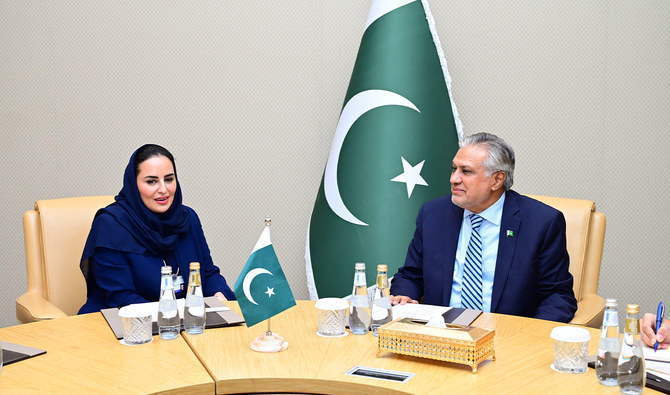
- Digital Cooperation Organization is an inter-governmental body that seeks to bridge digital gap in member states
- Foreign Minister Dar meets DCO secretary-general at sidelines of World Economic Forum meeting in Riyadh
ISLAMABAD: Pakistan’s Deputy Prime Minister and Foreign Minister Ishaq Dar and Digital Cooperation Organization’s (DCO) Secretary-General Deemah AlYahya on Sunday resolved to continue their joint collaboration and cooperation for economic development, the foreign ministry said in a statement.
The DCO is an inter-governmental body established in 2020 which is dedicated to achieving social prosperity and growth of digital economic. The DCO aims to achieve this by unifying the efforts of its member states to advance digital transformation and promote common interests of member states. DCO member states include Pakistan, Qatar, Saudi Arabia, Rwanda, Kuwait, Morocco, Nigeria, Oman, The Gambia, Ghana, Greece, Jordan, Bahrain, Bangladesh, Cyprus and Djibouti.
AlYahya is a Saudi digital economy expert and the founding secretary-general of the organization since her election to the post in April 2021. As DCO secretary-general, AlYahya is responsible for connecting heads of state, government ministers and private sector digital economy leaders to bridge the digital gap in member states.
She called on Foreign Minister Dar at the sidelines of the World Economic Forum’s Special Meeting in Riyadh on Sunday, Pakistan’s Ministry of Foreign Affairs (MoFA) said.
“The Deputy Prime Minister and Foreign Minister of Pakistan and the SG DCO affirmed their resolve to continue close collaboration and cooperation for the economic development and digital transformation of Pakistan, Saudi Arabia and other DCO member states,” MoFA said.
AlYahya recounted her visit to Pakistan earlier this month and spoke of the country’s “great potential” for technological advancement and digital transformation of its economy, MoFA said. “She emphasized that as founding member of DCO, Pakistan brings great value to the organization and has a significant role to play in its rise and progress,” it added.
Dar stressed the need for DCO member states to achieve capabilities in emerging technologies in the fast-evolving tech landscape, MoFA said. “In this connection, he appreciated DCO for providing the suitable platform to its member states for their digital advancement,” the statement said.
AlYahya separately posted about her “great meeting” with Dar on the social media platform X.
“With 64 percent of the population below 30 years old, many of whom are actively involved in the freelance industry, it is critical to ensure we undertake all collaborative efforts that will enable an ecosystem which lets the youth thrive and prosper in the new digital landscape,” she wrote on X.
PM Sharif, Saudi crown prince discuss bilateral ties and regional situation in Riyadh
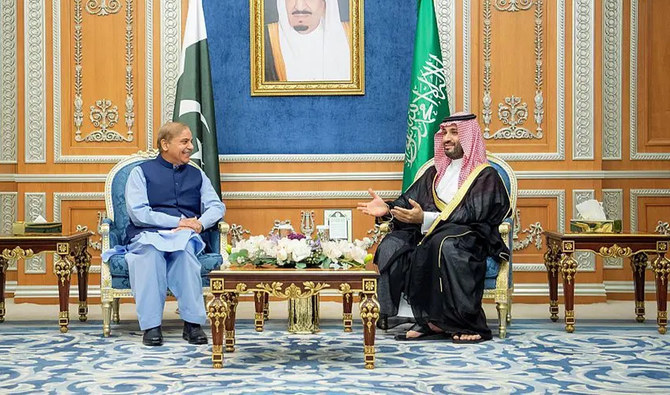
- PM Sharif attends Special Dialogue and Gala Dinner hosted by Saudi crown prince in Riyadh
- Sharif is in Riyadh to attend two-day World Economic Forum meeting, engage with world leaders
ISLAMABAD: Prime Minister Shehbaz Sharif met Saudi Crown Prince Mohammed bin Salman in Riyadh on Sunday evening during which the two leaders discussed bilateral relations between Pakistan and Saudi Arabia, the regional situation and Israel’s war on Gaza, Sharif’s office said in a statement.
Sharif, who arrived in Riyadh on Saturday to attend a two-day special meeting of the World Economic Forum, attended a Special Dialogue and Gala Dinner hosted by the Saudi crown prince in Riyadh. Sharif congratulated the Saudi crown prince for successfully organizing the WEF Special Meeting, the Prime Minister’s Office (PMO) said.
“The Prime Minister conveyed his prayers and good wishes for the health, happiness and long life of The Custodian of the Two Holy Mosques His Majesty King Salman bin Abdulaziz Al Saud,” the PMO said. “In addition to bilateral ties, the regional situation, particularly with regards to the crisis in Gaza, was also discussed.”
Sharif thanked the Saudi crown prince for sending a high-powered delegation, headed by Saudi Arabia’s Foreign Minister Minister Faisal bin Farhan, to Pakistan earlier this month. The delegation held key meetings with Pakistani ministers and businesspersons to enhance economic cooperation between the Kingdom and the South Asian country.
“To continue the discussion, the Prime Minister said that he has brought with him a high-powered delegation to Riyadh, including key Ministers responsible for investment, so that follow-up meetings could take place between relevant officials,” the PMO said.
Sharif reiterated his invitation to the Saudi crown prince to undertake an official visit to Pakistan at his earliest convenience, the PMO added.
Separately, Sharif met Saudi Arabia’s ministers of finance, investment and industry on Sunday at the sidelines of the WEF meeting. In his meeting with the Saudi finance minister, the two sides agreed that Saudi Arabia would explore more opportunities for investment in Pakistan.
Saudi Finance Minister Mohammed Al-Jadaan reiterated the Kingdom’s support for Pakistan’s economic development, Sharif’s office had said in a statement.
Pakistan and Saudi Arabia enjoy strong trade, defense and cultural ties. The Kingdom is home to over 2.7 million Pakistani expatriates and serves as the top source of remittances to the cash-strapped South Asian country.
Both Pakistan and Saudi Arabia have been closely working to increase their bilateral trade and investment, and the Kingdom recently reaffirmed its commitment to expedite an investment package worth $5 billion discussed previously with Islamabad.
Gunmen kill two laborers from Punjab province in southwest Pakistan — official
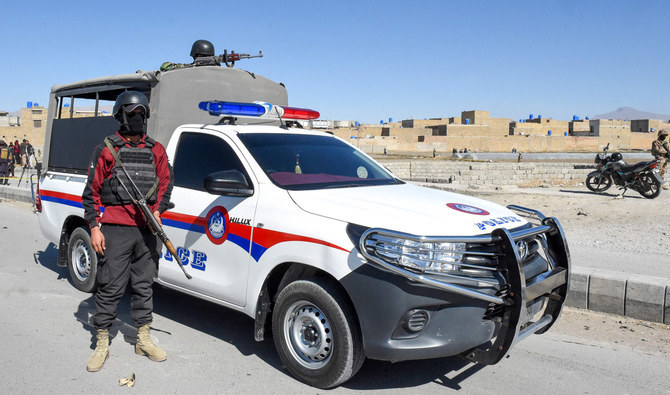
- The two laborers were working inside a garage in Tump area of Balochistan's Kech district when they came under attack
- No group immediately claimed responsibility, but Baloch separatists have previously targeted people from other provinces
ISLAMABAD: Unidentified gunmen on Sunday shot dead two laborers, who hailed from the eastern Punjab province, in the country's restive Balochistan province, a local official said.
The two laborers were working inside a garage in Tump area of Balochistan's Kech district when they came under fire by gunmen riding motorbikes, according to Saeed Umrani, commissioner of Makran Division where Kech is located.
No group immediately claimed responsibility for the attack, but Baloch separatists have previously targeted people from other provinces on suspicion of spying for state agencies.
"Both laborers, who were residents of the Punjab province, were killed on the spot," the official said.
Umrani said bodies of the deceased had been sent to their hometowns and the district administration was hunting for the perpetrators.
The attack came two weeks after armed men abducted nine passengers, who hailed from Punjab, from a bus and killed them near Balochistan's Noshki district.
The outlawed Balochistan Liberation Army claimed responsibility for the attack, saying it had information that plain-clothed spies were on the bus. The group offered no evidence to support its claim.
Balochistan has been the scene of a long-running insurgency by separatist militants who seek independence from the central government in Islamabad.
Although the government says it has quelled the insurgency, violence has continued to persist in the province.
Pakistan PM, Kuwaiti emir discuss transformation of bilateral ties into economic partnership
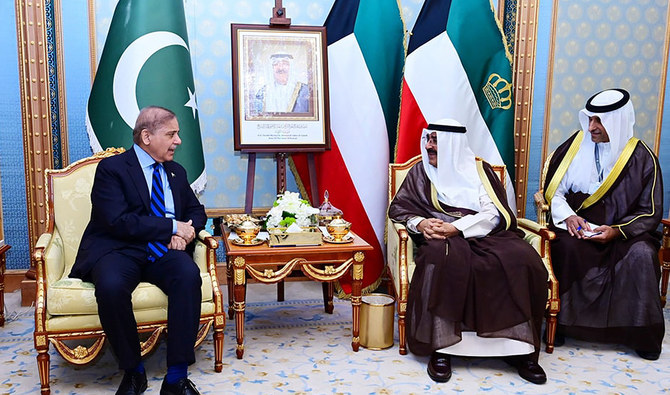
- The meeting came on the sidelines of a two-day World Economic Forum summit in Riyadh
- PM Shehbaz Sharif assured of efficient implementation of Pakistan-Kuwait deals signed in Nov.
ISLAMABAD: Pakistan Prime Minister Shehbaz Sharif on Sunday met with Emir of Kuwait Sheikh Mishal Al-Ahmad Al-Jaber Al-Sabah in Riyadh and discussed with him transformation of Pakistan-Kuwait ties into an economic partnership, Sharif’s office said.
The meeting came on the sidelines of a two-day World Economic Forum (WEF) summit on global collaboration, growth and energy on April 28-29.
PM Sharif thanked Sheikh Mishal for his congratulatory letter upon his re-election and congratulated him on assuming the role of the emir of Kuwait.
“The Prime Minister expressed his desire to work closely with His Highness to transform bilateral ties into a mutually beneficial economic partnership that would serve the best interests of the peoples of both countries,” Sharif’s office said in a statement.
The development came months after Pakistan and Kuwait signed several trade and investment agreements worth $10 billion during the visit of caretaker Pakistan PM Anwaar-ul-Haq Kakar to the Gulf country.
Besides these agreements, the two countries had signed three memorandums of understanding (MoUs) in the fields of culture, environment and sustainable development.
Pakistan’s army chief, General Asim Munir, had also accompanied the caretaker prime minister on the Kuwait visit in November, which was part of the Pakistani leadership’s ambitious plan to attract investment from the Middle East amid an economic slowdown at home.
“The Prime Minister assured the Kuwaiti leadership that these MoUs and agreements would be implemented in an efficient and timely manner,” the statement added.
“In addition to bilateral ties, the regional situation, particularly with regards to the crisis in Gaza, was also discussed.”










